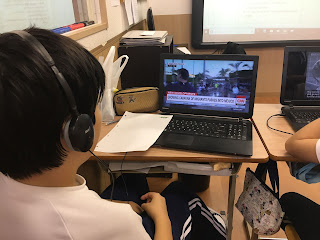One of our readings this week focused on the treatment of Japanese Americans during World War II, as the students have shown interest in why countries go to war and why the world has war. Students selected one of the RAZ Kids books: Camp Nowhere (a graphic book) and the nonfiction text Japanese American Incarceration.
On Tuesday we traveled to Maishima Incineration Plant to learn about why Osaka burns trash, but first we spent time at the beach picking up trash. The students and I were shocked by the amount of trash that littered the beach. Some of the students' thoughts:
 "I think some people use the beach as a trash can."
"I think some people use the beach as a trash can.""I think people do not appreciate the ocean and do not respect the fish that live in the water."

 |
| Not pictured: The coffee table, TV, tires, and other big objects |

Another of our readings this week focused on Malala Yousafzai. First, I read the book Malala's Magic Pencil to pique their interest and to get them jump started in asking questions about WHO is this girl, Malala. After lunch, students worked on different tasks: research, vlogging, and reading a brief biography of Malala from the Nobel Prize website. Students practiced their close reading strategies while either reading it alone or in a small group with me.
The students are continuing to vlog about their experiences and about what they're reading and learning. I am proud of their effort and their ability to make connections to all the concepts and topics we are exploring.




































